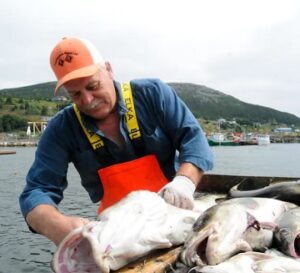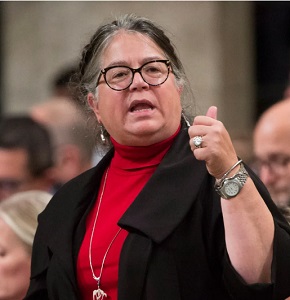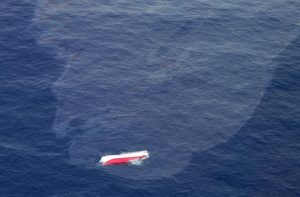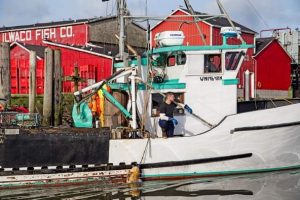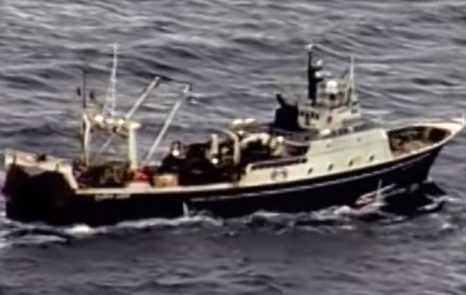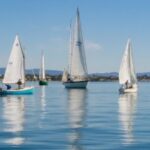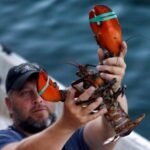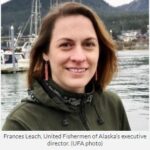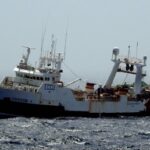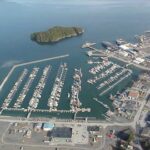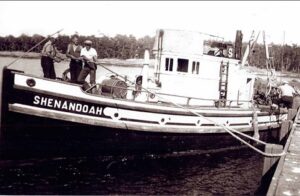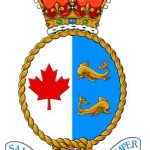Tag Archives: DFO
Red herring? Facing off over the sustainability of B.C.’s herring fishery
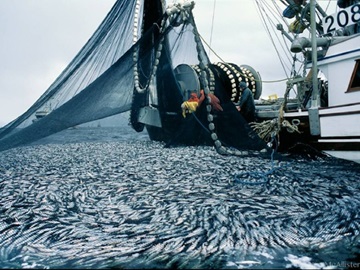 Calls for a last-minute moratorium are intensifying as the start of Pacific herring season in the Straight of Georgia approaches on Nov.24. Concerns are resurfacing among some citizens as they fear the potential impact of these fisheries on the province’s herring stock. According to Jim Shortreed, a Victoria-based herring enhancement volunteer, these numbers are unsustainable. When asked what would be the ideal biomass, the marine specialist couldn’t define the exact number. Ronnie Chickite, elected Chief of the region’s We Wai Kai Nation and herring fisherman with nearly three decades of experience, disagreed with Dixon’s assessment. >>click to read<< 08:52
Calls for a last-minute moratorium are intensifying as the start of Pacific herring season in the Straight of Georgia approaches on Nov.24. Concerns are resurfacing among some citizens as they fear the potential impact of these fisheries on the province’s herring stock. According to Jim Shortreed, a Victoria-based herring enhancement volunteer, these numbers are unsustainable. When asked what would be the ideal biomass, the marine specialist couldn’t define the exact number. Ronnie Chickite, elected Chief of the region’s We Wai Kai Nation and herring fisherman with nearly three decades of experience, disagreed with Dixon’s assessment. >>click to read<< 08:52
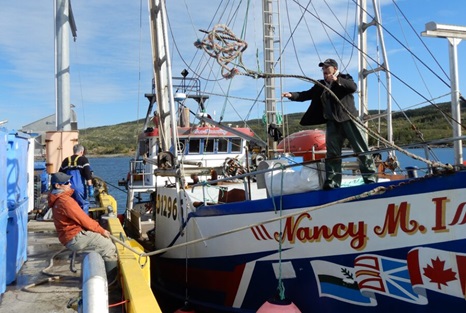
Northern cod numbers may have moved out of critical zone, says federal scientist
Captain Alex Saunders has more experience fishing northern cod than most fishermen. At 81 years old, the fishing captain has fished for cod off the Labrador coast for six decades. This year, he says, was a banner year for that fishery. “There were no codfish in northern Labrador for about 60 years, but this summer the cod were all along the Labrador coast from Blanc Sablan in the south to north of Nain,” Mr. Saunders says. A good catch rate this season meant Mr. Saunders’s crew hauled in 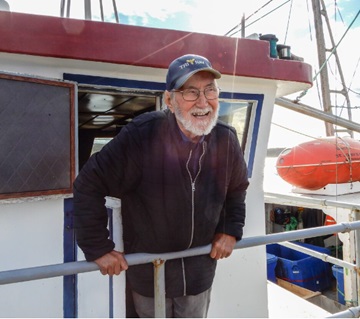 gillnets every day for weeks, returning to communities such as Pinsent’s Arm, a fishing town of about 50 people along the Labrador coast, to land cod at the wharf. But the season’s quick success also meant its early closing. “On a Friday afternoon they said, ‘Get your gear out of the water Sunday by six o’clock,’” Mr. Saunders says of the Department of Fisheries and Oceans’ (DFO) decision to shut down the fall northern cod stewardship fishery weeks earlier than planned – a measure to ensure fishing did not exceed season limits. Photos, >>click to read<< 08:33
gillnets every day for weeks, returning to communities such as Pinsent’s Arm, a fishing town of about 50 people along the Labrador coast, to land cod at the wharf. But the season’s quick success also meant its early closing. “On a Friday afternoon they said, ‘Get your gear out of the water Sunday by six o’clock,’” Mr. Saunders says of the Department of Fisheries and Oceans’ (DFO) decision to shut down the fall northern cod stewardship fishery weeks earlier than planned – a measure to ensure fishing did not exceed season limits. Photos, >>click to read<< 08:33
May deaths of two New Brunswick fishermen prompt advisory letter from TSB
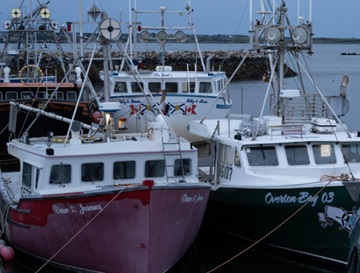 The Transportation Safety Board of Canada has issued a warning to three government bodies about overloading fishing boats, in response to the deaths of two New Brunswick lobster fishermen earlier this year. Fifty-eight-year-old Eugene Beaudin and his 33-year-old great-nephew, Normand Beaudin, fell off their fishing boat and died in the water off Miscou Island, N.B., on May 6. In the Oct. 30 letter to Transport Canada, Fisheries and Oceans Canada and WorkSafeNB, the safety board’s director of marine investigations, Clifford Harvey, wrote that the vessel Tracy Dawn left the harbour loaded with 119 traps and encountered rough weather. Harvey says the fishers fell overboard trying to drop traps into the water. >>click to read<< 18:50
The Transportation Safety Board of Canada has issued a warning to three government bodies about overloading fishing boats, in response to the deaths of two New Brunswick lobster fishermen earlier this year. Fifty-eight-year-old Eugene Beaudin and his 33-year-old great-nephew, Normand Beaudin, fell off their fishing boat and died in the water off Miscou Island, N.B., on May 6. In the Oct. 30 letter to Transport Canada, Fisheries and Oceans Canada and WorkSafeNB, the safety board’s director of marine investigations, Clifford Harvey, wrote that the vessel Tracy Dawn left the harbour loaded with 119 traps and encountered rough weather. Harvey says the fishers fell overboard trying to drop traps into the water. >>click to read<< 18:50
Fisheries and Oceans Canada doing a poor job of monitoring fishing industry: report
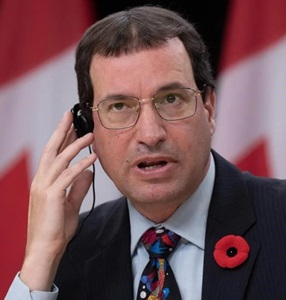 A new report slams the federal Fisheries Department for failing to properly monitor Canada’s commercial fishing industry. The report from the federal environment commissioner, Jerry DeMarco, says Fisheries and Oceans Canada lacks the ability to collect timely and dependable data about what is being caught. DeMarco says the dearth of reliable data means the department can’t protect Canada’s fish stocks from overfishing. The report from the federal environment commissioner, Jerry DeMarco, says Fisheries and Oceans Canada lacks the ability to collect timely and dependable data about what is being caught.>>click to read<< 13:02
A new report slams the federal Fisheries Department for failing to properly monitor Canada’s commercial fishing industry. The report from the federal environment commissioner, Jerry DeMarco, says Fisheries and Oceans Canada lacks the ability to collect timely and dependable data about what is being caught. DeMarco says the dearth of reliable data means the department can’t protect Canada’s fish stocks from overfishing. The report from the federal environment commissioner, Jerry DeMarco, says Fisheries and Oceans Canada lacks the ability to collect timely and dependable data about what is being caught.>>click to read<< 13:02
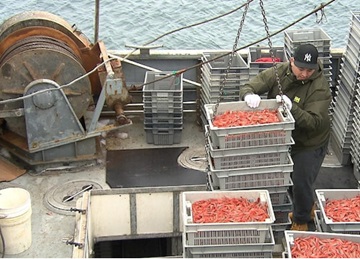
Northern Shrimp fishing: DFO proposals do not pass muster in the industry
Northern shrimp fishermen from Quebec and the Atlantic wholeheartedly reject the new precautionary approach presented by Fisheries and Oceans Canada (DFO) scientists to protect stocks. The fishing associations of Quebec, New Brunswick and Newfoundland and Labrador, industrialists and DFO scientists were gathered during two days for the advisory committee which ended Wednesday in Quebec. Northern shrimp stocks in the Estuary and Gulf of St. Lawrence are not likely to improve, according to Fisheries and Oceans Canada. >>click to read<< 11:47
Shrimp fishing: gloomy outlook and angry fishermen
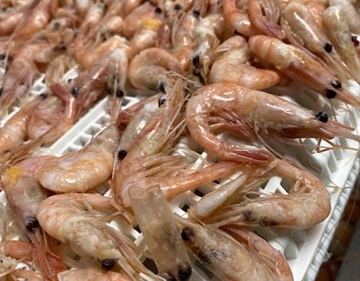 The state of northern shrimp stocks in the estuary and Gulf of St. Lawrence will not improve in the short and medium term and could even continue to deteriorate. It is this grim observation that Fisheries and Oceans Canada shared with the fishermen and processors gathered Tuesday in Quebec for the first day of the shrimp advisory committee of the Estuary and Gulf of Saint -Laurent. DFO biologists have clearly identified redfish predation as one of the main causes of the decline of shrimp stocks in the four fishing areas of the Estuary and Gulf. The warming of the water in the Gulf and the significant drop in oxygen levels also explain the drastic fall in northern shrimp stocks.>>click to read<<14:12
The state of northern shrimp stocks in the estuary and Gulf of St. Lawrence will not improve in the short and medium term and could even continue to deteriorate. It is this grim observation that Fisheries and Oceans Canada shared with the fishermen and processors gathered Tuesday in Quebec for the first day of the shrimp advisory committee of the Estuary and Gulf of Saint -Laurent. DFO biologists have clearly identified redfish predation as one of the main causes of the decline of shrimp stocks in the four fishing areas of the Estuary and Gulf. The warming of the water in the Gulf and the significant drop in oxygen levels also explain the drastic fall in northern shrimp stocks.>>click to read<<14:12
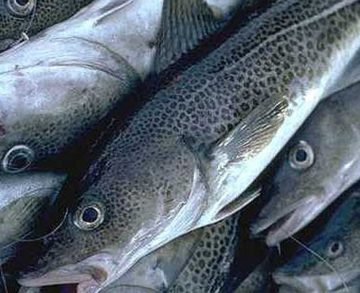
The NLGIDC are pleased with DFO’s revised assessment Model for Northern Cod
The Newfoundland and Labrador Groundfish Industry Development Council (NLGIDC) are pleased that The Department of Fisheries and Oceans (DFO) has implemented a revised model for assessing the 2J3KL cod stock. This model now utilizes data back to 1954 and shows that the 2J3KL cod stock is out of the critical zone and into the cautious zone of the Precautionary Approach (PA) Framework. In fact, the new model indicates the stock has been in the cautious zone since 2016. Previously the model only used data back to 1983. “The NLGIDC and other groups have been seeking changes to the stock assessment model for a number of years,” says Jim Baird, the Chair of the NLGIDC. >>click to read the Press Release<< 14:51
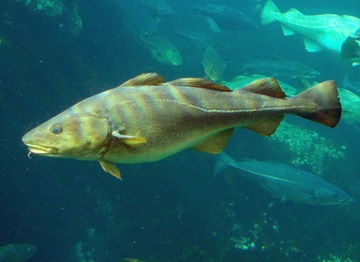
New DFO northern cod assessment model shows stock out of critical zone
Fisheries and Oceans Canada has implemented a new assessment model for the 2J3KL northern cod stock, which reveals the stock has likely been out of the critical zone since 2016. The new model assesses the long-term productivity using tagging and landing data from the last 70 years. The old model used data beginning in 1983, but research scientist Paul Regular says the model has been expanded to pull on data from as far back as 1954. “A bunch of changes were accepted, and they helped us improve the understanding of the past trends in the stock, and also the relationship between adult cod and young cod,” Regular said Wednesday. >>click to read<< 19:11
The Legal Fishery Sparking Arrests and Violence
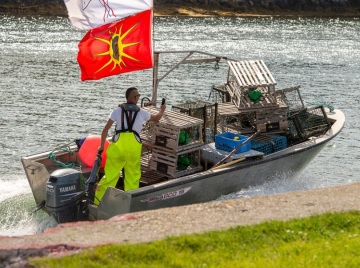 Atlantic Canada is home to the country’s most lucrative fisheries, including lobster—with an export value of CAN $3.2-billion in 2021—and young American eels, or elvers, which can sell for $5,000 per kilogram. But in 1999, the Supreme Court decision changed who could take a slice of this profitable pie. The court ruled in the case of Donald Marshall Jr. from Membertou First Nation in Nova Scotia. Marshall had been arrested in 1993 for catching and selling adult eels without a license and for harvesting outside the commercial fishing season. When the Supreme Court acquitted Marshall, six years later, the decision hinged on his treaty rights as an Indigenous person. Beyond acquitting him, the ruling—known as the Marshall decision—legally affirmed the rights of individuals belonging to 35 Mi’kmaq, Wolastoqey, and Peskotomuhkati First Nations to earn a living by fishing. Photos, >>click to read<< 10:31
Atlantic Canada is home to the country’s most lucrative fisheries, including lobster—with an export value of CAN $3.2-billion in 2021—and young American eels, or elvers, which can sell for $5,000 per kilogram. But in 1999, the Supreme Court decision changed who could take a slice of this profitable pie. The court ruled in the case of Donald Marshall Jr. from Membertou First Nation in Nova Scotia. Marshall had been arrested in 1993 for catching and selling adult eels without a license and for harvesting outside the commercial fishing season. When the Supreme Court acquitted Marshall, six years later, the decision hinged on his treaty rights as an Indigenous person. Beyond acquitting him, the ruling—known as the Marshall decision—legally affirmed the rights of individuals belonging to 35 Mi’kmaq, Wolastoqey, and Peskotomuhkati First Nations to earn a living by fishing. Photos, >>click to read<< 10:31
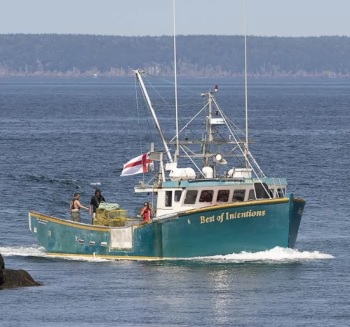
More than 50 Indigenous fish harvesters in the Maritimes charged or on trial
Three years after a First Nation started a self-regulated lobster fishery that sparked protests and violence in Nova Scotia, federal prosecutors are pressing ahead with charges against dozens of Indigenous fishers, some of whom are planning constitutional challenges. On Sept. 17, 2020, the Sipekne’katik First Nation issued five lobster licences to its members, saying they could trap and sell their catch outside the federally regulated season. The bold move came exactly 21 years after the Supreme Court of Canada affirmed the treaty right of Indigenous groups in Eastern Canada to hunt and fish for a moderate livelihood, but interpretations of that landmark ruling remain in dispute. >>click to read<< 09:25
4 North Atlantic right whales spotted in Bay of Fundy
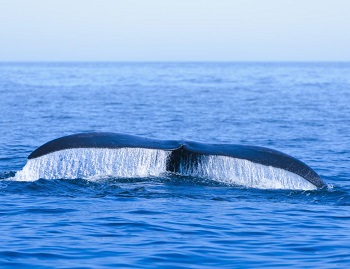 Four North Atlantic right whales were spotted Saturday in the Bay of Fundy — the first documented sighting of the species in that area this year. “Every sighting is very important,” said Dion, noting how few North Atlantic right whales exist. Dion said she and the team quickly began documenting the sightings and called the Canadian Whale Institute for official documentation. The Department of Fisheries and Oceans was also contacted, along with Fundy Traffic. They were able to identify the four whales as North Atlantic right whales, a welcome confirmation. >>click to read<< 19:04
Four North Atlantic right whales were spotted Saturday in the Bay of Fundy — the first documented sighting of the species in that area this year. “Every sighting is very important,” said Dion, noting how few North Atlantic right whales exist. Dion said she and the team quickly began documenting the sightings and called the Canadian Whale Institute for official documentation. The Department of Fisheries and Oceans was also contacted, along with Fundy Traffic. They were able to identify the four whales as North Atlantic right whales, a welcome confirmation. >>click to read<< 19:04
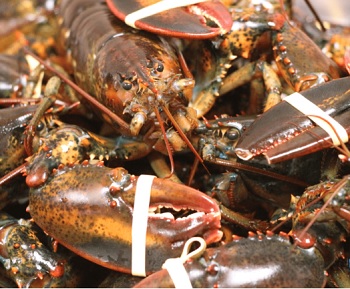
Observer companies dumped from monitoring of N.S. lobster fishery
This season, DFO will rely solely on an inshore industry association to assess what other species are being accidentally captured — what’s known as bycatch — in the lobster fishery from Halifax through the Bay of Fundy. Observer companies Javitech Atlantic in Dartmouth and Halifax’s Atlantic Catch Data have been part of the bycatch monitoring program since it was launched in 2018 to assess and demonstrate sustainability in the fishery worth half a billion dollars. Both companies are out for now. In recent years, they have not delivered anywhere near the sampling provided by the Yarmouth-based Southwest Lobster Science Society, which was created by five fishing associations to provide bycatch monitoring. >>click to read<< 08:30
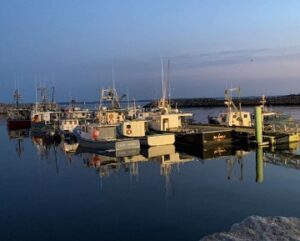
DFO calls for calm in St. Mary’s Bay as enforcement continues
The Department of Fisheries and Oceans calling for safety and patience in St. Mary’s Bay. Tensions have been rising once again due to out of season lobster fishing taking place. In a statement, DFO says they’re committed to a renewed relationship with Indigenous peoples, so they can exercise their Treaty rights to fish. They say many are exercising that right through the Food, Social and Ceremonial fishery, authorized by DFO. But they say it has to comply with the Fisheries Act, and they are seizing gear and laying charges for those who don’t follow the rules. DFO has been getting flack from local commercial fishers and opposition leaders, demanding that they do more to enforce the rules. >>click to read<< 08:43
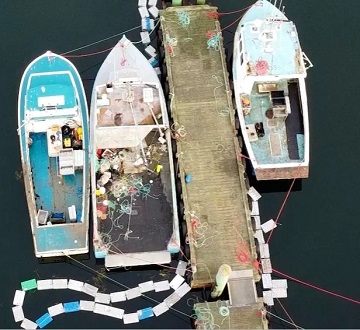
‘Enforce the laws’: N.S. Liberals to feds, province on lobster dispute
As the conflict over Sipekne’katik’s moderate livelihood fishery once again heats up in St. Marys Bay, the provincial Liberal party has split from their federal counterparts. On Tuesday, Nova Scotia Liberal Leader Zach Churchill called for the provincial government to start revoking the licences of any buyers found to be purchasing lobster caught without a licence issued by Fisheries and Oceans Canada (DFO). And he called out the federal government for a lack of enforcement of the Fisheries Act. “We are talking about hundreds of thousands or millions of dollars of lobster being landed illegally. There has to be a disincentive. … DFO also has to enforce the laws of the land which prohibit large-scale poaching.” >>click to read<< 12:34
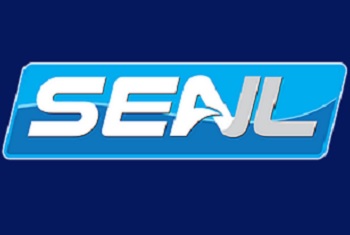
DFO investigates fishing licences for outside control
Seaward Enterprises Association of Newfoundland and Labrador (SEA-NL) encourages inshore owner-operators who have lost control of their commercial licences or fishing enterprise to contact Fisheries and Oceans, which is actively investigating several cases. “If you are not in control of your boat or licences then contact DFO and have it looked into and made right,” says Ryan Cleary, SEA-NL’s Executive Director. “By law, licensed inshore harvesters must be independent — solely in control of their enterprises, licences, and catches — and if you are not then SEA-NL encourages you to take control.” >>click to read<< 08:45
N.S. fishing industry, conservation groups at odds over new herring quota
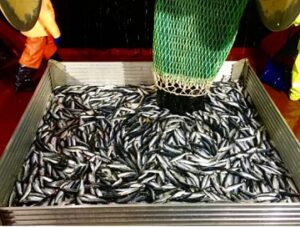 Nova Scotia’s fishing industry and conservation groups are at odds over a new herring quota set by Fisheries and Oceans Canada (DFO) this season. The quota, or total allowable catch (TAC), off southwestern Nova Scotia and New Brunswick is now limited to 21,000 tonnes for 2023, an 11 per cent reduction from the previous year. The commercial herring fishery is worth about $19.5 million, according to DFO. But the new quota doesn’t sit well with Oceans North and the Ecology Action Centre. Ian McIsaac, president of the Seafood Producers Association of Nova Scotia, said the industry is disappointed that the quota was cut. >click to read< 16:31
Nova Scotia’s fishing industry and conservation groups are at odds over a new herring quota set by Fisheries and Oceans Canada (DFO) this season. The quota, or total allowable catch (TAC), off southwestern Nova Scotia and New Brunswick is now limited to 21,000 tonnes for 2023, an 11 per cent reduction from the previous year. The commercial herring fishery is worth about $19.5 million, according to DFO. But the new quota doesn’t sit well with Oceans North and the Ecology Action Centre. Ian McIsaac, president of the Seafood Producers Association of Nova Scotia, said the industry is disappointed that the quota was cut. >click to read< 16:31
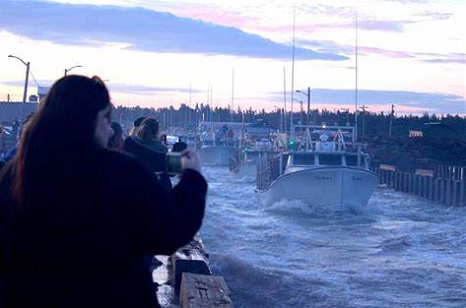
Fall fishery finally gets underway
On calm waters on a beautiful August morning, the fall lobster season in LFA 25 finally opened on Sunday following several delays due to weather conditions. The fall fishery was scheduled to open on Aug 9, but last Monday the Department of Fisheries and Ocean (DFO) decided to delay the opening until at least Aug 10 because of unfavourable forecasts. On Aug 11, it was confirmed that the LFA 25 fall lobster season would open at 6 am on Sunday, but only to set the gear. An agreement was made there would be no lobster fishing on Sunday. Photos, >click to read< 08:44
Northumberland Strait fall lobster fishery opens under favorable conditions
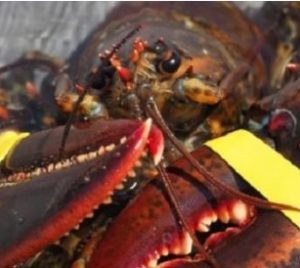 After several delays, the fall lobster season is officially underway in Lobster Fishing Area 25. This region includes fishermen from southern PEI, northwestern Nova Scotia, and southeastern New Brunswick. The season was supposed to start on Wednesday but was pushed forward due to bad weather. Charlie McGeoghegan, president of the Lobster Fishers of PEI Marketing Board, says the boats set out on Sunday morning to cast their nets. “Any time you can get a scheduled day where the weather is nice and everyone is safe, they are optimistic,” McGeoghegan said. >click to read< 08:53
After several delays, the fall lobster season is officially underway in Lobster Fishing Area 25. This region includes fishermen from southern PEI, northwestern Nova Scotia, and southeastern New Brunswick. The season was supposed to start on Wednesday but was pushed forward due to bad weather. Charlie McGeoghegan, president of the Lobster Fishers of PEI Marketing Board, says the boats set out on Sunday morning to cast their nets. “Any time you can get a scheduled day where the weather is nice and everyone is safe, they are optimistic,” McGeoghegan said. >click to read< 08:53
New commercial whelk fishery to open in eastern Nova Scotia
 A new commercial Whelk fishery that will officially start in the spring of 2024 was announced Friday outside Louisbourg Seafood facilities in Louisbourg, N.S. “It’s a big deal and it means we will have stability going forward,” said Al MacLean, senior operations manager for Louisbourg Seafoods. Whelk is a large sea snail that is harvested in deep waters and generally exported to Asia. The goal is to increase the availability and quality of seafood in international markets, while creating jobs here at home. “We have 65 people working here today and they’ll work for three-and-a-half to four months beyond what their normal work period was and we hope in the future that we see that grow. We can see allocations to Louisbourg grow and our production staff grow along with it,” said MacLean. Video, >click to read< 08:02
A new commercial Whelk fishery that will officially start in the spring of 2024 was announced Friday outside Louisbourg Seafood facilities in Louisbourg, N.S. “It’s a big deal and it means we will have stability going forward,” said Al MacLean, senior operations manager for Louisbourg Seafoods. Whelk is a large sea snail that is harvested in deep waters and generally exported to Asia. The goal is to increase the availability and quality of seafood in international markets, while creating jobs here at home. “We have 65 people working here today and they’ll work for three-and-a-half to four months beyond what their normal work period was and we hope in the future that we see that grow. We can see allocations to Louisbourg grow and our production staff grow along with it,” said MacLean. Video, >click to read< 08:02
Unfavourable forecasts continue to keep P.E.I. lobster boats off water
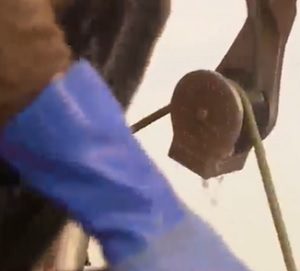 Wednesday was supposed to be trap setting day for the fall fishery, which operates in the Northumberland Strait along the south coast from North Cape to Victoria-by-the-Sea, as well as off northern New Brunswick. But crews and officials decided to delay the start of the season during a weather conference call with the Department of Fisheries and Oceans Tuesday. Another call Wednesday afternoon ended with no consensus on a Friday opening, so another call will be held at 10 a.m. AT Thursday to consider updated forecasts. The P.E.I. Fishermen’s Association says that means Saturday will be the earliest possible opening day. >click to read< 10:43
Wednesday was supposed to be trap setting day for the fall fishery, which operates in the Northumberland Strait along the south coast from North Cape to Victoria-by-the-Sea, as well as off northern New Brunswick. But crews and officials decided to delay the start of the season during a weather conference call with the Department of Fisheries and Oceans Tuesday. Another call Wednesday afternoon ended with no consensus on a Friday opening, so another call will be held at 10 a.m. AT Thursday to consider updated forecasts. The P.E.I. Fishermen’s Association says that means Saturday will be the earliest possible opening day. >click to read< 10:43
Research groups sound alarm after three whales reportedly struck by ships off West Coast
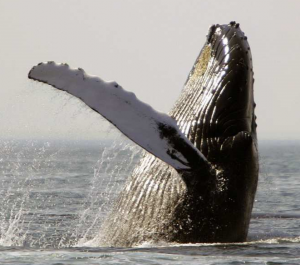 Three whales were reportedly struck by vessels in northern B.C. waters over a 10-day period last month, raising West Coast humpback researchers’ concerns over the risk shipping poses to the marine mammals. The first report involved a BC Ferries vessel, the Northern Expedition, colliding with a whale in Wright Sound near Kitimat on July 20, Fisheries and Oceans Canada (DFO) confirmed. A second incident on July 21 involved a boat that transports workers to Alcan’s Rio Tinto power generation facility in Kitimat. And a cruise ship struck a whale in Hecate Strait between Haida Gwaii and the B.C. mainland on July 29, DFO said. Shipping traffic and humpback whale populations are both on the rise, often in the same areas, escalating the risk of vessel strikes to humpbacks, the greatest threat to the species of special concern along with entanglements in fishing gear.>click to read< 17:46
Three whales were reportedly struck by vessels in northern B.C. waters over a 10-day period last month, raising West Coast humpback researchers’ concerns over the risk shipping poses to the marine mammals. The first report involved a BC Ferries vessel, the Northern Expedition, colliding with a whale in Wright Sound near Kitimat on July 20, Fisheries and Oceans Canada (DFO) confirmed. A second incident on July 21 involved a boat that transports workers to Alcan’s Rio Tinto power generation facility in Kitimat. And a cruise ship struck a whale in Hecate Strait between Haida Gwaii and the B.C. mainland on July 29, DFO said. Shipping traffic and humpback whale populations are both on the rise, often in the same areas, escalating the risk of vessel strikes to humpbacks, the greatest threat to the species of special concern along with entanglements in fishing gear.>click to read< 17:46
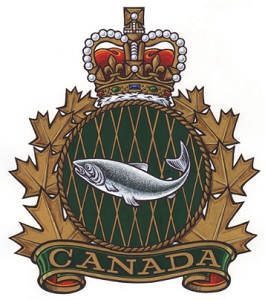
Scientists Level New Critiques of Fisheries and Oceans Canada’s Scientific Rigor
Twenty-five years ago, after the collapse of the Atlantic cod fishery, Jeffrey Hutchings, a preeminent fisheries scientist and professor at Dalhousie University in Nova Scotia, sounded the alarm that Canada’s federal fisheries department was allowing “nonscience influences” in critical decision-making. Writing at the time, he said, “There is a clear and immediate need for Canadians to examine very seriously the role of bureaucrats and politicians in the management of Canada’s natural resources.” Today, a new crop of researchers is once again imploring Fisheries and Oceans Canada (DFO) to change its ways. At the core of their concerns is a number of systemic and structural ways in which DFO gathers, parses, and handles scientific information, and how that advice is passed on to decision-makers. >click to read< 09:20
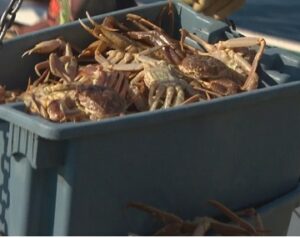
Endangered right whale movements ‘totally different’ in Gulf of St. Lawrence in 2023
“What we saw this year was totally different compared to other years,” said Marcel Hebert of the Acadian Crabbers Association in Shippagan, N.B. “The North Atlantic right whale were found in very shallow waters, under 20 fathoms. It’s the first time we saw that since 2017 when we started to watch.” Their first appearance in the Gulf was a disastrous surprise for a species on the brink of extinction and the people who earn their living in those waters. Twenty of the whales died in the Gulf between 2017 and 2019. In Atlantic Canada, a single right whale detection closes a 2,100 square kilometre area of open water for 15 days and in the Gulf for the entire season if they keep showing up or stay. “Let’s be honest, this is hard for harvesters,” Gilchrist said. >click to read< 09:47
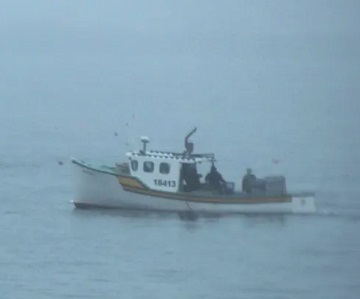
Despite whale detection, western Cape Breton crab fishers will complete quota in days
Part of Snow Crab Area 19, Cape Breton’s largest crab fishing zone in the Gulf of St. Lawrence, has been restricted for at least 15 days by the Department of Fisheries and Oceans (DFO). That comes after a North Atlantic right whale was detected last week by an acoustic sensor near Pleasant Bay. As a result, the Department of Fisheries and Oceans (DFO) has ordered fishers with traps in Area 19 to move them to the far north or south parts of the zone by Monday evening. While it is extra work to move the traps, most fishers anticipate almost no impact on the overall catch. “Catches are good, so a lot of the boats will be finished up in the next couple of days,” said Sandy Doucette, who fishes out of Cheticamp. >click to read< 20:00
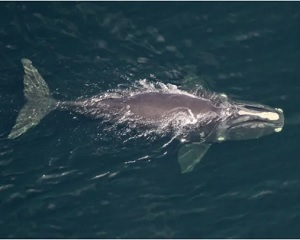
Entangled North Atlantic right whale spotted in Gulf of St. Lawrence
A North Atlantic right whale has been spotted entangled in the Gulf of St. Lawrence, near Lamèque in northeastern New Brunswick. A research vessel saw the whale, a 13-year-old male known as EG No. 4042, east of Lamèque and northwest of Prince Edward Island, on Saturday, Fisheries and Oceans Canada announced Monday. He appears to be carrying a “long trailing line, with no visible buoys,” according to a news release. Groups who respond to marine mammals in distress planned to attempt to disentangle the whale on Sunday morning but couldn’t because of the weather. >click to read< 13:47
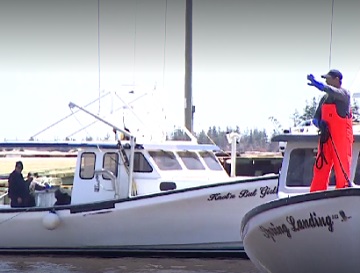
Expect more temporary closures of P.E.I. lobster fishery, DFO says
Future in-season closures of the P.E.I. lobster fishery are not out of the question as more endangered right whales are spotted in shallow waters, says Fisheries and Oceans Canada. A portion of Lobster Fishing Area 24 was shut down in May after two right whales were spotted off P.E.I.’s north shore. It was the first time DFO had to close off that part of the area due to a whale sighting, and it meant lobster crews had to move their traps to shallower waters. It’s likely not the last time it will happen, said Brett Gilchrist, DFO’s director of national programs. Video, >click to read< 15:25
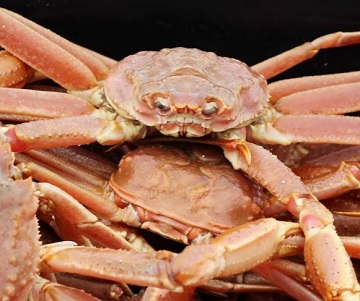
Still a lot of crab to be caught in Newfoundland and Labrador
A 2022 report by consultant David Conway, who was commissioned by the province to review the fish price setting system, recommended the industry begin discussions in October of that year to establish a formula for crab prices for the 2023 season. However, discussions between the FFAW and ASP didn’t get going until March, partly because both groups saw a change in leadership over the winter with Keith Sullivan resigning as union and Derek Butler leaving as executive director of the ASP. The decision on prices for this season fell to the province’s Fish Price Setting Panel which used the final offer selection model, where processors and the union each made a pitch on price and the panel had to choose one or the other. >click to read< 13:12
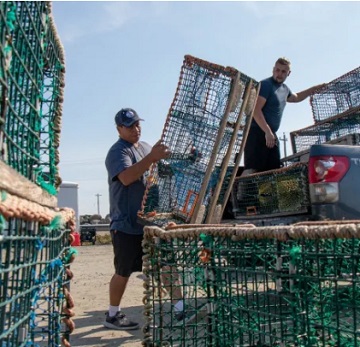
DFO says it has enough resources to monitor Indigenous lobster fishing in Nova Scotia
Fisheries and Oceans Canada (DFO) says its enforcement branch will be on the water and adequately equipped to monitor compliance of First Nations lobster fisheries this summer. The pledge follows the chaotic fishery for baby eels this spring where there was widespread illegal activity by some Indigenous and non-Indigenous harvesters. DFO shut down the legal elver fishery, affecting both commercial licence holders and Indigenous groups with fishing plans approved by the department. But “poaching”, as federal Fisheries Minister Joyce Murray called it, continued. “I want to clarify they are two very different fisheries,” Maritimes region director of conservation and protection Tim Kerr told reporters Monday in a briefing on Indigenous rights-based lobster fisheries. >click to read< 08:35






